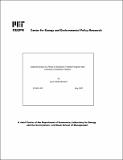| dc.contributor.author | Montero, Juan Pablo | en_US |
| dc.contributor.other | Massachusetts Institute of Technology. Center for Energy and Environmental Policy Research. | en_US |
| dc.date.accessioned | 2009-04-03T17:07:55Z | |
| dc.date.available | 2009-04-03T17:07:55Z | |
| dc.date.issued | 1997. | en_US |
| dc.identifier | 97004 | en_US |
| dc.identifier.uri | http://hdl.handle.net/1721.1/45073 | |
| dc.description.abstract | In this paper we explore the welfare implications of voluntary compliance within an emissions trading program and derive optimal permits allocations to affected and opti-in sources when the environmental regulator has incomplete information on individual unrestricted emissions and control costs. The regulator faces a trade-off between production efficiency (minimization of control costs) and information rent extraction (reduction of excess permits allocated to opt-in sources). The first-best equilibrium can be attained if the regulator can freely allocate permits to affected and opt-in sources; otherwise a second-best equilibrium is implemented. The latter is sensitive to uncertainty in control costs and benefits | en_US |
| dc.description.sponsorship | Supported by the National Oceanic and Atmospheric Administration through an award the the MIT Center for Energy and Environmental Policy Research. | en_US |
| dc.format.extent | 24 p | en_US |
| dc.publisher | MIT Center for Energy and Environmental Policy Research | en_US |
| dc.relation.ispartofseries | MIT-CEEPR (Series) ; 97-004WP. | en_US |
| dc.title | Optimal design of a phase-in emissions trading program with voluntary compliance options | en_US |
| dc.type | Working Paper | en_US |
| dc.identifier.oclc | 37377778 | en_US |
